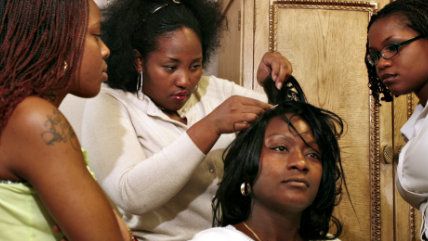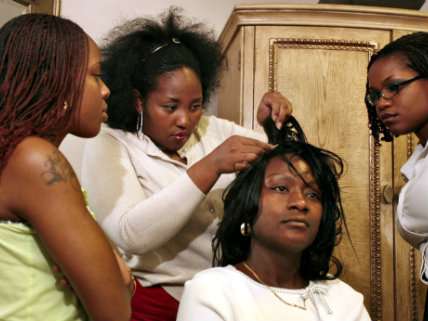Licensing Rules Hold Back Hair Braiders and the Economy
Sixteen states require hair braiders to get cosmetology licenses, which cost hundreds to thousands of dollars and require at least 1,000 hours of training.


"Why should Virginia always be at the end of the pack?" groused Terry McAuliffe during the Democratic National Convention. He was hacked off that the state Supreme Court had overturned his executive order on felons' voting rights.
It might be small consolation to the governor, but in other areas of particular interest to African-Americans, Virginia is ahead of the curve. Case in point: hair braiding.
Four years ago the commonwealth freed practitioners of African-style hair braiding from a requirement forcing them to get licensed as cosmetologists. As the Department of Professional and Occupational Regulation explained, "based on complaints, no evidence of public harm supported the continued regulation of hair braiding."
That is the case across the country, according to a new report by the Arlington-based Institute for Justice. "Barriers to Braiding" nevertheless finds that 16 states require hair braiders to get cosmetology licenses. Another 14 states, plus the District of Columbia, stop short of that but still require them to get specialized braiding licenses.
Cosmetology licensing costs hundreds to thousands of dollars, and usually requires at least 1,000 hours—nearly half a year of 40-hour weeks—of training. In South Dakota, a cosmetology license takes 2,100 hours.
This might make sense if hair braiding posed serious—or even minimal—health and safety problems. But it doesn't. The Institute for Justice combed through the complaint files in the states that keep records on hair braiders specifically. The results? "The overwhelming majority of licensed or registered braiders never received a complaint, regardless of their state and how many training hours it required for licensure."
Out of 9,700 braiders, only 95 had a complaint on file. Only one complaint came from an actual consumer. The rest came from licensing boards or competitors, and "most complaints were about licensure status." The bulk of the complaints all originated in one state—Florida—and four-fifths of them came from the Board of Cosmetology. Over a seven-year period, the 9,700 braiders generated a grand total of four complaints about health and safety. (Another 27 complaints against unlicensed braiders turned up. Most of them were about licensing status.)
This is not surprising, because occupational licensing regimes often have far less to do with protecting the public from harm than with protecting market incumbents from competition. Business groups and trade associations, rather than consumer-welfare groups, often raise the loudest demands for occupational licensing and other barriers to market entry. They are looking out for their own economic welfare, not the public good - though of course they claim the opposite. That can be a hard case to make when you're arguing for the licensure of, say, interior designers or florists.
But the regulations do achieve their intended purpose: IJ found that occupational license restrictions limit competition: "In 2012, Mississippi, which requires zero hours of training, had over 1,200 registered braiders. Neighboring Louisiana, which requires 500 hours, had only 32 licensed braiders—despite its larger black population."
Hair braiding constitutes just one small part of a much larger problem. The percentage of jobs that you need a government permission slip for has increased from one in 20 a half-century ago to one in four today, and it is headed toward one in three.
In many cases, the jobs are those on the lower end of the income ladder, which creates obstacles for people trying to climb it. And on this score, despite its enlightenment about hair braiding, Virginia does quite poorly. In 2012 the Institute for Justice examined 102 low-end occupations (manicurists, taxi drivers, home-entertainment system installers and so on). It found that the commonwealth required licenses for 46 of them, which made it the eighth most onerous state for occupational licensing in the country.
The haphazard way states license various occupations provides further evidence of the tenuous connection to consumer welfare. The average number of states in which a given occupation is licensed is 22, and they are not the same 22. Only 15 occupations are licensed in 40 states or more.
The licensing requirements for a given occupation vary wildly among states, and a given state's requirements for various occupations vary wildly: Oklahoma, for instance, requires four times as many hours of training to become a hair braider as it requires to become an emergency medical technician.
This is one area where partisans of all stripes can agree—and, in fact, have. The conservative Heritage Foundation objects to excessive licensing, and so does the Obama White House: It says such rules are "limiting worker mobility and reducing wages."
McAuliffe and the Republican-controlled General Assembly agree on very little and cooperate on even less. If they'd like to move Virginia forward, maybe this is one issue where they could find common ground.
This column originally appeared at the Richmond Times-Dispatch.


Show Comments (7)